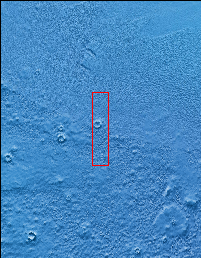
|
Olympia Undae
- Click the image above for a larger view
- Full-Res JPEG (595 x 2712) (157.4 kB)
- Full-Res TIFF (595 x 2712) (1.5 MB)
Caption:

Context image
This VIS image shows part of Olympia Undae, a vast sand sea near the north pole. In regions with limited sand abundance, individual dunes form and the surface below the dunes are visible. This is the case at the top of the image. When sand abundances grow, the individual dunes coalesce into a sheet of sand hiding the underlaying surface. This is the case at the bottom of the image.
Orbit Number: 80393 Latitude: 80.0028 Longitude: 143.285 Instrument: VIS Captured: 2020-01-28 21:30
Background Info:
Please see the THEMIS Data Citation Note for details on crediting THEMIS images.
NASA's Jet Propulsion Laboratory manages the 2001 Mars Odyssey mission for NASA's Science Mission Directorate, Washington, D.C. The Thermal Emission Imaging System (THEMIS) was developed by Arizona State University, Tempe, in collaboration with Raytheon Santa Barbara Remote Sensing. The THEMIS investigation is led by Dr. Philip Christensen at Arizona State University. Lockheed Martin Astronautics, Denver, is the prime contractor for the Odyssey project, and developed and built the orbiter. Mission operations are conducted jointly from Lockheed Martin and from JPL, a division of the California Institute of Technology in Pasadena.
Cataloging Keywords:
| Name | Value | Additional Values |
|---|---|---|
| Target | Mars | |
| System | ||
| Target Type | Planet | |
| Mission | 2001 Mars Odyssey | |
| Instrument Host | Mars Odyssey | |
| Host Type | Orbiter | |
| Instrument | Thermal Emission Imaging System (THEMIS) | |
| Detector | ||
| Extra Keywords | Dune, Grayscale, Thermal | |
| Acquisition Date | ||
| Release Date | 2020-04-10 | |
| Date in Caption | 2020-01-28 | |
| Image Credit | NASA/JPL-Caltech/ASU | |
| Source | photojournal.jpl.nasa.gov/catalog/PIA23835 | |
| Identifier | PIA23835 | |
